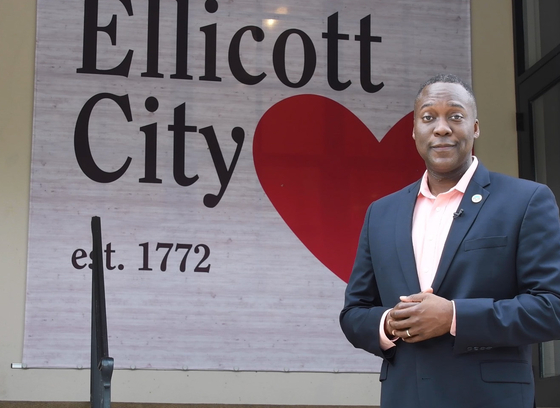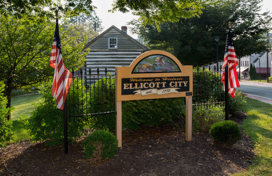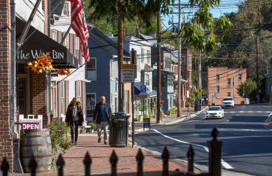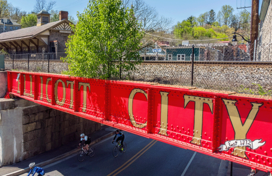About
The Safe and Sound initiative is not just a plan, it’s a promise — a steadfast commitment to every resident, business owner, and visitor. Our dual mission is clear: to implement state-of-the-art flood mitigation measures ensuring the safety and well-being of all, and to celebrate and preserve the rich historical tapestry that makes Ellicott City unique.
Through comprehensive research, community collaboration, and a focus on sustainability, we have devised a plan that aims to minimize future flood risks while honoring our town’s past. We invite you to explore this initiative and join us in our journey towards a Safe and Sound Ellicott City.

Learn more about Safe & Sound
News Archive
2025
---
Howard County Executive Calvin Ball’s Impactful Ellicott City Safe and Sound Debris-Clearing Initiative Surpasses 100,000 Pound Mark
HCG News Release - March 17, 2025
---
Howard County Executive Calvin Ball Provides Comprehensive Update on Ellicott City Safe and Sound Progress
HCG News Release - February 3, 2025
---
2024
---
Howard County Begins Phase 1 of Ellicott City Safe and Sound T-1 Flood Mitigation Pond
HCG News Release - September 26, 2024
---
Howard County Executive Calvin Ball Breaks Ground on Highly Anticipated Ellicott City Safe and Sound North Tunnel Project
HCG News Release - June 24, 2024
---
Howard County Executive Calvin Ball Breaks Ground on Largest Ellicott City Flood Control Pond to Date
HCG News Release - June 4, 2024
---
Howard County Executive Calvin Ball Provides Comprehensive Update on the State of Historic Ellicott City
HCG News Release - January 18, 2024
---
2023
Ellicott City Safe and Sound Debris Clean-Up Completed After Tropical Storm Ophelia
HCG News Release - October 5, 2023
---
Maryland’s Prestigious Emergency Management Project of the Year Awarded to Howard County’s Ellicott City Safe and Sound Outdoor Tone Alert System
HCG News Release - June 30, 2023
---
Howard County Opens Critical Ellicott City Safe & Sound Flood Mitigation Project
HCG News Release - February 13, 2023
---
Howard County Executive Calvin Ball Provides Critical Update on Ellicott City Extended North Tunnel
HCG News Release - January 30, 2023
---
2022
2021
HCG News Release - December 2, 2021
WMAR News Video - December 2, 2021
---
CBS Baltimore - October 4, 2021
---
Baltimore SUN - August 25, 2021
Baltimore SUN - August 16, 2021
WMAR News Video - August 16, 2021
Baltimore SUN - August 6, 2021
---
Yahoo! News - April 25, 2021
PATCH - April 22, 2021
HCG News Release - April 15, 2021
CBS Baltimore - April 10, 2021
---
Baltimore SUN - March 25, 2021
CBS Baltimore - March 25, 2021
---
PATCH - February 18, 2021
Baltimore SUN - February 17, 2021
---
PATCH - January 20, 2021
HCG News Release - January 12, 2021
---
2020
WMAR News - November 5, 2020
---
CBS Baltimore - October 18, 2020
---
Baltimore SUN - September 23, 2020
WBAL TV - September 17, 2020
---
Baltimore SUN - August 27, 2020
WBAL TV - August 27, 2020
Good Morning America - August 11, 2020
CBS Baltimore - August 3, 2020
---
Maryland Matters - July 24, 2020
---
CBS Baltimore - June 10, 2020
---
Fox News - May 19, 2020
---
Baltimore SUN - April 8, 2020
BBJ - April 6, 2020
HCG News Release - April 6, 2020
Baltimore SUN - April 1, 2020
---
Baltimore SUN - March 20, 2020
WBAL - March 10, 2020
---
2019
WTOP - November 18, 2019
---
WTOP - October 11, 2019
Baltimore SUN - October 9, 2019
NPR - October 8, 2019
---
Baltimore SUN - September 17, 2019
---
Bay Journal - August 5, 2019
---
Baltimore SUN - July 30, 2019
WJZ - July 18, 2019
WTOP - July 12, 2019
Washington Post - July 5, 2019
Engineering News Record - July 3, 2019
---
CITYLAB - May 24, 2019
Fox 5 DC - May 13, 2019
Maryland Matters - May 13, 2019
WTOP - May 13, 2019
---
The Daily Record - April 17, 2019
WTOP - April 17, 2019
WBALTV - April 17, 2019
Patch - April 17, 2019
SUN/Times - April 17, 2019
---
HCG News Release - March 22, 2019
WTOP - March 14, 2019
---
Patch - February 20, 2019
HCG News Release - February 19, 2019
HCG News Release - February 19, 2019
News - February 15, 2019
WJZ - February 7, 2019
WBAL - February 7, 2019
SUN/Times Article - February 7, 2019
Daily Record Article - February 7, 2019
WTOP Article - February 7, 2019
HCG News Release - February 7, 2019
HCG News Release - February 1, 2019
---
HCG News Release - January 14, 2019
HCG News Release - January 4, 2019
---
2018
WTOP Article - December 28, 2018
Patch - December 28, 2018
Baltimore Sun Papers - December 27, 2018
HCG News Release - December 27, 2018
Washington Post Article - December 27, 2018
WTOP Article - December 27, 2018
Baltimore Business Journal - December 27, 2018
WJZ News Video - December 27, 2018
WBAL News Video - December 27, 2018
WMAR News Video - December 27, 2018
WBFF News - December 27, 2018
Patch - December 20, 2018
WMAR News - December 18, 2018
Documentation
Section 106 Process
As part of the Ellicott Safe and Sound Plan, Howard County is required to satisfy the mandates of Section 106 of the National Historic Preservation Act (NHPA). Section 106 specifies that federal agencies must take into account the affect their undertakings will have on historic and culturally significant resources. Section 106 requires a Federal agency to identify historic properties, assess their undertaking’s effects upon historic resources, and seek to avoid, minimize or mitigate any adverse effects. This is done through coordination with the State Historic Preservation Office (SHPO), the public, and consulting parties.
A Federal undertaking is defined as a project, activity or program either funded, permitted, licensed or approved by a Federal agency. The Ellicott City Safe and Sound projects are a series of flood mitigation projects that require the United States Army Corps of Engineers to issue a permit under Section 404 of the Clean Water Act, making the project a federal undertaking and subject to Section 106 review. The Section 404 permit is required because the projects have the potential to impact Waters of the United States, which the Corps has jurisdiction over. The Corps of Engineers is the lead Federal agency for the project and Howard County is the applicant for the permit.
Historic Resources
The National Historic Preservation Act established the National Register of Historic Places (NRHP), which is overseen by the National Park Service. The NRHP is the official list of our country’s historic and culturally significant resources that should be preserved. These include historic buildings, districts, archaeological sites, structures and objects. In order to be considered historic, a resource must meet specific criteria. It must:
-
be significant to a major pattern/trend of history (Criterion A)
-
be associated with a significant person or group of people (Criterion B)
-
illustrate distinctive or exceptional architectural styles or methods of construction (Criterion C)
-
have the ability to provide information important to history or prehistory through archaeological study (Criterion D).
Consulting Parties
Section 106 requires the lead agency to identify potential Consulting Parties. A Consulting Party is a person or organization with a demonstrated legal, economic, or historic preservation interest in an undertaking that has potential to affect historic properties. Examples include historic preservation groups, community groups, property owners, and others. Interested individuals and organizations must express their desire in being a consulting party and the Agency is responsible for approving all requests to participate.
The first Consulting Parties meeting was held on November 9, 2020. Click here to review the presentation from that meeting and click here to review the minutes. Due to a change in the Safe and Sound plan that eliminated projects on the West End and extended the North Tunnel, a second Consulting Parties meeting was necessitated. The second Consulting Parties meeting was held on June 11, 2021. Click here to review the presentation from that meeting and click here to watch the recording.
Area of Potential Effects
One of the first steps in the Section 106 process is establishing an Area of Potential Effects (APE) for the proposed undertaking. The Area of Potential effect includes the addresses in, and adjacent to the area which each project will take place. The Ellicott City Safe and Sound Plan includes many projects, including the Maryland Ave Culverts and the North Tunnel. The affected addresses are determined by the proposed footprint of each project. Preliminary engineering on each project constitutes the basis for the determination. As with any project, as detailed design progresses, the effects or affected properties will become more clearly defined.
Assessment of Effects
Section 106 requires the Agency to consider if and how an undertaking will affect historic resources. Section 106 notes that an adverse effect may occur when an “undertaking may alter, directly or indirectly, any characteristic of a historic property that qualify it for inclusion in the National Register in a manner that would diminish the integrity of the property’s location, design, setting materials, workmanship, feeling or association.”
Examples of adverse effects can include, but are not limited to:
-
Physical destruction or damage, alteration of a property that is not consistent with the Secretary of the Interior Standards for the Treatment of Historic Properties.
-
Moving it from its location.
-
Introduction of visual, atmospheric, or audible elements, neglect, or other changes that impact the elements that contribute to a historic resources significance.
Resolving Adverse Effects
If an undertaking results in a finding of an Adverse Effect to historic resources, the Agency must:
-
Consult with the SHPO and other consulting parties.
-
Afford the public the opportunity to comment.
-
Seek ways to avoid, minimize or mitigate the adverse effects.
-
Notify the Advisory Council on Historic Preservation (ACHP).
Status of Section 106 Review Process
The county underwent a federal review in order to meet the Section 106 requirements, and the County entered into a Programmatic Agreement as a result of the Section 106 process.
For more information on the Section 106 process, visit: https://www.achp.gov/protecting-historic-properties.
For more information on consulting parties, see the Advisory Council on Historic Preservation’s Citizen Guide to Section 106 by clicking here.
Flood Safety Studies & Assessments
Assessments and Studies
U.S. Army Corps of Engineers
Plans, Updates, & Meeting Presentations
Plans
Updates
- Ellicott City Safe & Sound Update - August 2, 2021
- Ellicott City Safe & Sound Update - August 2, 2021
Presentations


